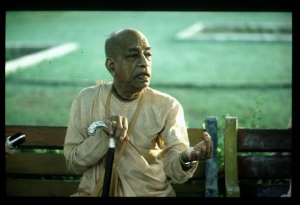SB 10.79.3-4: Difference between revisions
m (1 revision(s)) |
(Vanibot #0018 edit: make synonym terms in Sanskrit italic in SB - Vanisource) |
||
| Line 1: | Line 1: | ||
{{info | {{info | ||
|speaker= | |speaker=Śukadeva Gosvāmī | ||
|listener=King | |listener=King Parīkṣit | ||
}} | }} | ||
[[Category:Srimad-Bhagavatam - Canto 10 Chapter 79|s03-04]] | |||
[[Category:Bhagavatam Verses Spoken by Sukadeva Gosvami - Vanisource]] | |||
<div style="float:left">'''[[Srimad-Bhagavatam]] - [[SB 10|Tenth Canto]] - [[SB 10.79: Lord Balarama Goes on Pilgrimage|Chapter 79: Lord Balarāma Goes on Pilgrimage]]'''</div> | |||
<div style="float:right">[[File:Go-previous.png|link=SB 10.79.2]] '''[[SB 10.79.2]] - [[SB 10.79.5]]''' [[File:Go-next.png|link=SB 10.79.5]]</div> | |||
{{RandomImage}} | |||
{{SBnotice}} | |||
==== TEXTS 3-4 ==== | ==== TEXTS 3-4 ==== | ||
<div | <div class="verse"> | ||
taṁ vilokya bṛhat-kāyaṁ | :taṁ vilokya bṛhat-kāyaṁ | ||
bhinnāñjana-cayopamam | :bhinnāñjana-cayopamam | ||
tapta-tāmra-śikhā-śmaśruṁ | :tapta-tāmra-śikhā-śmaśruṁ | ||
daṁṣṭrogra-bhru-kuṭī-mukham | :daṁṣṭrogra-bhru-kuṭī-mukham | ||
sasmāra mūṣalaṁ rāmaḥ | |||
para-sainya-vidāraṇam | :sasmāra mūṣalaṁ rāmaḥ | ||
halaṁ ca daitya-damanaṁ | :para-sainya-vidāraṇam | ||
te tūrṇam upatasthatuḥ | :halaṁ ca daitya-damanaṁ | ||
:te tūrṇam upatasthatuḥ | |||
</div> | </div> | ||
| Line 21: | Line 27: | ||
==== SYNONYMS ==== | ==== SYNONYMS ==== | ||
<div | <div class="synonyms"> | ||
''tam''—him; ''vilokya''—seeing; ''bṛhat''—immense; ''kāyam''—whose body; ''bhinna''—broken; ''añjana''—of black eye-makeup; ''caya''—a pile; ''upamam''—resembling; ''tapta''—burning; ''tāmra''—(colored like) copper; ''śikhā''—whose topknot; ''śmaśrum''—and beard; ''daṁṣṭrā''—with its teeth; ''ugra''—fearsome; ''bhru''—of eyebrows; ''kuṭī''—with furrows; ''mukham''—whose face; ''sasmāra''—remembered; ''mūṣalam''—His club; ''rāmaḥ''—Lord Balarāma; ''para''—opposing; ''sainya''—armies; ''vidāraṇam''—which tears asunder; ''halam''—His plow; ''ca''—and; ''daitya''—demons; ''damanam''—which subdues; ''te''—they; ''tūrṇam''—at once; ''upatasthatuḥ''—presented themselves. | |||
</div> | </div> | ||
{{SBcollapse}} | |||
==== TRANSLATION ==== | ==== TRANSLATION ==== | ||
<div | <div class="translation"> | ||
The immense demon resembled a mass of black carbon. His topknot and beard were like molten copper, and his face had horrible fangs and furrowed eyebrows. Upon seeing him, Lord Balarāma thought of His club, which tears to pieces His enemies' armies, and His plow weapon, which punishes the demons. Thus summoned, His two weapons appeared before Him at once. | The immense demon resembled a mass of black carbon. His topknot and beard were like molten copper, and his face had horrible fangs and furrowed eyebrows. Upon seeing him, Lord Balarāma thought of His club, which tears to pieces His enemies' armies, and His plow weapon, which punishes the demons. Thus summoned, His two weapons appeared before Him at once. | ||
</div> | </div> | ||
__NOTOC__ | </div> | ||
</div> | |||
<div style="float:right">[[File:Go-previous.png|link=SB 10.79.2]] '''[[SB 10.79.2]] - [[SB 10.79.5]]''' [[File:Go-next.png|link=SB 10.79.5]]</div> | |||
__NOTOC__ | |||
__NOEDITSECTION__ | |||
Revision as of 19:20, 1 December 2017

A.C. Bhaktivedanta Swami Prabhupada
Please note: The synonyms, translation and purport of this verse were composed by disciples of Śrīla Prabhupāda
TEXTS 3-4
- taṁ vilokya bṛhat-kāyaṁ
- bhinnāñjana-cayopamam
- tapta-tāmra-śikhā-śmaśruṁ
- daṁṣṭrogra-bhru-kuṭī-mukham
- sasmāra mūṣalaṁ rāmaḥ
- para-sainya-vidāraṇam
- halaṁ ca daitya-damanaṁ
- te tūrṇam upatasthatuḥ
SYNONYMS
tam—him; vilokya—seeing; bṛhat—immense; kāyam—whose body; bhinna—broken; añjana—of black eye-makeup; caya—a pile; upamam—resembling; tapta—burning; tāmra—(colored like) copper; śikhā—whose topknot; śmaśrum—and beard; daṁṣṭrā—with its teeth; ugra—fearsome; bhru—of eyebrows; kuṭī—with furrows; mukham—whose face; sasmāra—remembered; mūṣalam—His club; rāmaḥ—Lord Balarāma; para—opposing; sainya—armies; vidāraṇam—which tears asunder; halam—His plow; ca—and; daitya—demons; damanam—which subdues; te—they; tūrṇam—at once; upatasthatuḥ—presented themselves.
Translation and purport composed by disciples of Śrīla Prabhupāda
TRANSLATION
The immense demon resembled a mass of black carbon. His topknot and beard were like molten copper, and his face had horrible fangs and furrowed eyebrows. Upon seeing him, Lord Balarāma thought of His club, which tears to pieces His enemies' armies, and His plow weapon, which punishes the demons. Thus summoned, His two weapons appeared before Him at once.